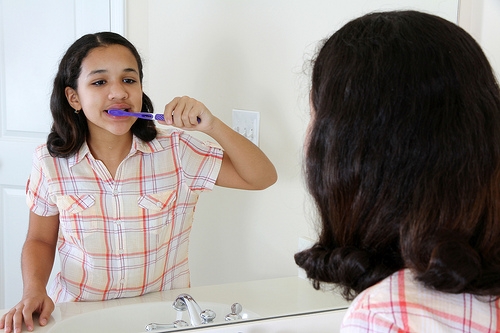April 26th, 2017

While there is no definite evidence that if your prevent gum diseases, like periodontitis, that you may be able to prevent a heart condition or heart disease. The only thing experts, like Dr. Henagan, know for sure is that if you take care of your gums it can lessen atherosclerosis, (build-up of artery clogging plaque) that may result in a heart attack or stroke.
Could periodontal disease cause heart attacks?
Regardless of your oral health, if you're at a high risk for heart disease, you need to take action.
- Maintain a healthy weight or lose weight.
- Consume healthy foods and beverages.
- Exercise several days the week. Walking is a powerful and lightweight exercise and will clear your head while helping your body get or stay healthy.
- Control any medical conditions you may have such as high cholesterol, diabetes, or high blood pressure.
- Reduce your stress. Have lunch with a friend, go for a walk in the park, take a bubble bath, mediate, or do whatever you find relaxing.
- Get a social life. Laughing reduces stress and “feel good” hormones. Everyone needs to feel like they are a part of something: join a book club or any activity where you can interact with other people at least once or twice a week
- Be sure to get enough sleep. The recommended amount is eight to nine hours a night. It has been proven that a lack of sleep increases your risk for angina, strokes, and heart attacks.
- Practice good oral hygiene to keep bacteria in check and your mouth healthy.
Contact our New Iberia, LA office if you have questions about your heart and oral health. If you take practice good oral hygiene, both your mouth and your heart will thank you.
April 19th, 2017

Nobody likes a dry mouth. It is an uncomfortable and sometimes oddly unexplainable sensation that most people like to avoid. It is not a condition that automatically sends you into a panic about your health, however, a dry mouth can be a bother and something you certainly want to change if possible. So, if you find yourself in the unpleasant position of having a dry mouth, here is what you can do.
Chew Sugar-free Gum: Chewing sugar-free gum will stimulate saliva in your mouth. The chewing motion of your jaw and teeth should take care of at least some of your dry mouth problem.
Suck on Sugar-free Candy: Similarly to chewing sugar free gum, if you suck on sugar free candy it should create more saliva in your mouth and moisturize it in the process.
Cut out the Caffeine:Caffeine can contribute to a dry mouth so by limiting, or eliminating your intake all together, you may find that your dry mouth is no more.
Stop Using Tobacco Products: Tobacco is another cause of dry mouth. Whether it is smokeless tobacco products or cigarettes, if you stop using them your dry mouth will likely improve. And not to forget, these products are exceedingly bad for your oral health to begin with, so you will be doing your mouth a favor even more so.
Drink Lots of Water: It may seem obvious, but drinking lots of water will likely improve your dry mouth. This is because dry mouth is usually a sign of dehydration, so plenty of fluids will surely help.
Dry mouth can be unpleasant, but it is often easily solved by either drinking more water, or trying one of the previously mentioned techniques. If the problem still persists you can always visit our New Iberia, LA office to see Dr. Henagan. More often than not, doing one of the above will leave your mouth more moisturized than it was previously, and hopefully it will be long-lasting as well.
April 12th, 2017

Dr. Henagan and our team at Henagan Team Dentistry frequently get questions about cavity causes and prevention. You brush twice a day and floss regularly. You rinse with mouthwash, just like the dentist recommended. In fact, you can’t remember the last time you had a cavity, but you think it was when you were a little kid. In all seriousness, you thought only kids got cavities.
The Signs and Symptoms of a Cavity
It’s believed that roughly 90% of North Americans will get at least one cavity in their lifetime. Those other ten percent, it seems, can eat as much pie, cake, and sugary cereals and sweets as they want. That’s not really true; just a stab at dental humor, and it was as bad as the pain your cavity is probably giving you.
When a cavity is in its initial stages, you will often be symptom-free and experience no discomfort at all. It’s not until the tooth decay has reached a certain level that you will begin to notice the signs and symptoms. While a toothache and sensitivity to hot and cold foods and liquids are surefire signs that you have a cavity, there are lesser-known symptoms as well. If you’re experiencing any of these warning signs, you may want to consider making an appointment with our office as soon as possible:
- Persistent bad breath or a bad taste in the mouth
- When you bite down, there is a sticky, tarry feeling
- Puss or discharge around a tooth
- A visible discoloring, usually black or brown
- Small pits or holes in the tooth
Routine dental care is important. While good oral hygiene, a healthy diet, and regular cleanings will deter the formation of cavities, they do not constitute a foolproof practice. A cavity can occur at any time, no matter what your age. Bacteria causes tooth decay, and no amount of brushing, flossing, and rinsing will eradicate all the bacteria from your mouth. If you think you may have a cavity, please contact our office immediately.
April 5th, 2017

Sports are great for children for a variety of reasons. Children can develop their motor skills, learn how to solve conflicts and work together, and develop their work ethics. As a parent, you may recognize the benefits of sports, but also naturally worry about your child’s health and safety. Your job goes beyond providing a water bottle and making sure your child follows the rules of the game.
Although you may not think of your child’s teeth first when you think about sports, accidents can happen that affect your children’s teeth. A stray hockey stick, an errant basketball, or a misguided dive after a volleyball are examples of ways a child could lose a tooth. In fact, studies show that young athletes lose more than three million teeth each year.
Becoming a Better Athlete to Protect Teeth
Becoming a better athlete involves refining skills, learning the rules of the game, and being a good sport. These components are not just about winning. They are also about safety. Young athletes who are better ball-handlers and who are careful to avoid fouls and penalties are less likely to have harmful contact with the ball, teammates, or opponents. Children who are better roller-bladers are less likely to take a face plant into the blacktop, and more likely to save their teeth. Being a good sport and avoiding unnecessary contact is one way to protect teeth.
Proper Protective Equipment for Teeth
If your child is in a sport that poses a high threat to teeth, it is essential for your child to wear a mouthguard. Mouthguards fit your child’s mouth and consist of soft plastic. Dr. Henagan can custom fit a mouthguard if generic ones are uncomfortable. While children may resist wearing a mouthguard initially, your persistence in insisting that they wear it should be enough to convince them. A helmet or face mask provides additional protection.
While prevention is best, rapid treatment can improve the situation if your child does happen to lose a tooth during sports. Rapid implantation can work in about ten percent of cases. To learn about ways to save a lost tooth, contact our New Iberia, LA office.





